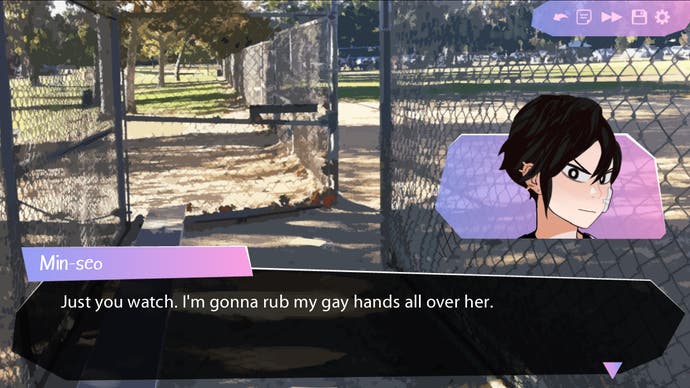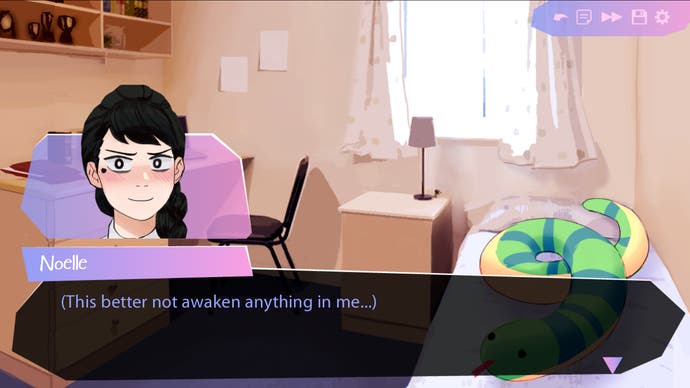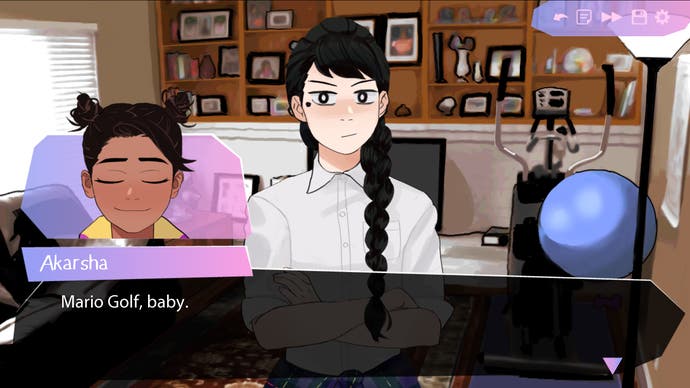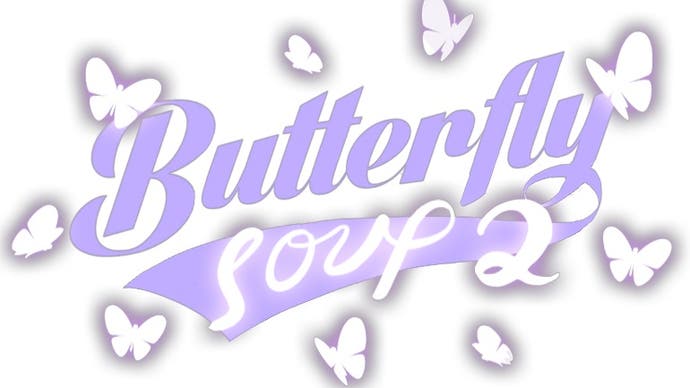Putting the gay in video games: a recipe for Butterfly Soup
And what is the gayest sport?
When the first Butterfly Soup arrived back in 2017, it was a surprise hit among queer gamers who were enthralled by its diverse cast of gay teens, its chaotic humour and its poignant exploration of the intersections between sexuality, gender and race - all centred around the joys of baseball. Games like this are still far from the norm and five years ago Butterfly Soup wound up feeling like something of a landmark game for those who had been longing to see themselves and their experiences represented on screen.
In 2022 a sequel arrived and this time it was far from emerging out of nowhere but instead thrown into the waiting arms of an eager audience, myself among them. But a lot has happened between the releases of these games, both in terms of events in the world and the industry itself, with queer representation ramping up somewhat in the time since the original Butterfly Soup. This landmark game's sequel arrived into a very different landscape from the first.
"Back when I started out, I felt alone," Brianna Lei, creator of Butterfly Soup, tells me, to give a lay of the land. "There weren't any Western visual novels that looked like what I was trying to make. The closest thing I had as reference was Brendan Hennessy's 2015 text adventure Birdland. I felt like I was wandering into uncharted territory. Or like I was driving to a restaurant I'd never seen before, without GPS." By her estimation, things have improved a lot and she's happy find her sequel has come with much more company. "Queer visual novels have become common enough that a few of them were even released pretty close to Butterfly Soup 2. It's like other people joined me in the woods I was lost in, and together our footsteps have formed a trail in the dirt. I don't feel like a madwoman muttering to herself in the wilderness anymore!"
With the rising tide of diverse indie games, I asked if there were any queer games in particular from the last few years she was impressed by. "I adored Brendan Hennessy's latest text adventure, The Grown-Up Detective Agency! It's a really deftly executed short story about a gay private investigator who's forced to solve a case with her time-travelling twelve-year-old self. It captures the heartache of gay unrequited childhood love so, so well!" Brianna points to work beyond games too and I'm over the moon to find another fellow Gideon the Ninth fan out in the wild. "I'm also a big fan of Tamsyn Muir's The Locked Tomb, a series of novels about lesbian necromancers in space. It's not a videogame, but the author was influenced by visual novels like 999 and Higurashi, and it shows!"
A lot can change in just a few year. When I was growing up, queer media was scarce and treasured representation was often deeply imperfect. What influences helped Brianna towards Butterfly Soup? Surprisingly, the TV show Skins. "It came out while I was in high school and I was surprised by how queer it was for its time. The show definitely had its flaws, but something about how it lavished attention on its teenage characters really stuck with me. Each episode focused on a different character - Episode 1 was Tony, episode 2 was Cassie, and so on. Butterfly Soup's chapter format was inspired by that." Yet the series' shortcomings were every bit as impactful as its successes. "My high school experience was totally devoid of the wild parties and drugs its characters indulged in, so a lot of their problems were foreign to me. And all the queer characters were white. It made me long to see a story where the lives of Asian-American teens were painted as vividly as the lives of white British teens were in Skins."
Despite Skins impact, the direct inspiration for Butterfly Soup came during Brianna's time in college. "I became obsessed with sports anime like Free!, Oofuri, and Haikyuu! Since I was majoring in videogame design, I thought, "I wanna make a game about an all-girls' baseball team!" The idea was so dear to me that I didn't want to "use" it on class projects, so I started developing it in my spare time. I would sketch the characters on the bus or subway on my way to work and class."
This act of creating Butterfly Soup in her spare time was something that changed drastically between the development of the first and second game. "For most of the first game's production, I had a super long subway commute that I'd use to sketch the characters," she explains. Between games, she got a job she drove to. "Suddenly, all I could do on my commutes was listen to audiobooks! My drawing time totally evaporated. So unfortunately my drawing abilities sunk to all-new lows at some points. But maybe in exchange, I became smarter because of the audiobooks?"

Given its importance to Butterfly Soup, I had to ask an important question, perhaps the most important of all: is baseball the gayest sport? "I'm going to say something controversial here: I think baseball is the funniest and most romantic sport in the world, but I actually don't think it's a contender for gayest sport." I'm shocked! "In my opinion, softball, bouldering, and soccer all have it beat." With the recent world cup, Brianna is surer than ever. "I just watched a video of a soccer player embracing his opponent and sensually biting his neck." As an avid climber, I'm proud to see bouldering ranked so high though. "I'm so curious what's attracting everyone to it!* Personally, I'm allergic to sports that expose my lack of upper-body strength, so I just stick to running." And I asked but no, Brianna has not yet watched the gay baseball show, A League of their Own.
Humour is such an essential part of Butterfly Soup and something that it makes seem effortless. As someone who finds comedy daunting to write, I wondered, how does Brianna find writing jokes for these games? Easier than being serious, it turns out. "For example, when Noelle strikes out during the game, I thought Chryssa would feel pretty self-satisfied if she managed to pull out a wise, encouraging saying, like a coach in a sports movie," she says. "But realistically, she's a kid and only has like, one second to come up with something, so she ends up saying, "Did you try? Yes. But did you fail? Also yes." If I hadn't made a joke out of that moment, Chryssa would've actually said something deep...Which means I'd have to think of something deep. The game would probably still be in development if I wrote like that! I'd need a whole new brain to be able to handle it." For Brianna, she's more impressed by those who can manage a serious tone. "I think it takes a lot of courage to sincerely put a story out there without having even a little humor to hide behind."
So much of that humour comes from the game's chaotic teens. What drew Brianna to that time in people's lives? Why these youngsters? "When you're a teenager, everything feels so intense because you're experiencing so many situations and emotions for the first time ever. And because they're brand new to you, you react to those things in absolutely bonkers ways. The first time your crush calls you cute, it's the best thing on earth. The first time someone confronts you for saying the wrong thing, it's the end of the world. There's really no other time of life this catastrophically messy and that's a lot of fun to explore as a writer."

The four leads represent a whole spectrum of queerness, in a way that feels entirely organic. How did she approach writing them in terms of their diversity? "I deliberately tried to make the four main characters the opposite of each of the other three on at least one axis. For example, Diya is a star athlete while Noelle is an out-of-shape nerd. Diya is big and anxious while Min is small and brave. Diya is terrified of being perceived as weird while Akarsha is weird on purpose because she's desperate for attention." The characters being able to constantly challenge and push each other with considerably different world views was the key part. "I think I was especially successful with Min and Noelle, who are polar opposites in multiple ways (how much they tolerate risk, how much they value following rules, how in-touch they are with their cultures and mother tongues, etc)." Yet there was other key ingredient: dumb. "For each way that a character is smart, they need to be outrageously, mind blowingly stupid in another way. For instance, Noelle is a math competition champion, but has an elementary school-level understanding of sex."
The game, especially the sequel, touches on a wide range of sensitive topics but always with a considered deftness. Whether it's familial abuse, homophobia or racism, many games stumble or avoid these issues all together. Was Brianna worried about tackling them? "I really try not to write in fear of making internet strangers upset anymore. The original Butterfly Soup got criticized for a wide variety of things ranging from Akarsha joking that Communism sucks to it being ableist for using the word stupid. The most intense negative reaction it got was from someone who was truly upset by its depictions of child abuse. At first, this stuff got to me and I was playing the literary equivalent of Twister writing Butterfly Soup 2 trying not to upset even more people. But eventually, I realized it was an impossible task. My games aren't for everyone. Stories exploring topics that have traumatized people will always make people uncomfortable. So yeah... Ultimately I ignored absolutely everything people said about my first game and wrote what I wanted to write."
Though that didn't mean there wasn't additional panic. "It scared the shit out of me when the Taiwanese game Devotion was pulled from Steam after outrage over its inclusion of art mocking the Chinese president! I got paranoid that Butterfly Soup 2 would start some controversy or get review-bombed if I didn't nix the bits discussing China/Taiwan relations. In the end, I kept them in, but I was really on the fence for a hot second."

For all the potential controversy, at its heart, Butterfly Soup 1 and 2 are games about queerness, something the world has felt increasingly hostile to lately. How does Brianna feel about creating queer art in the present time? "As a creator, the worse things get, the more determined I feel! This is going to sound weird and sinister, but I sort of think of writing my games like writing propaganda, but it's all propaganda that normalizes being LGBTQ. I'm going to try to make my next game bigger and more mainstream to mind control more people." Better watch out straights, looks like videogames are out to hijack your brain with their gayness.
*[Writer's note: The buff women. It's the buff women.]


